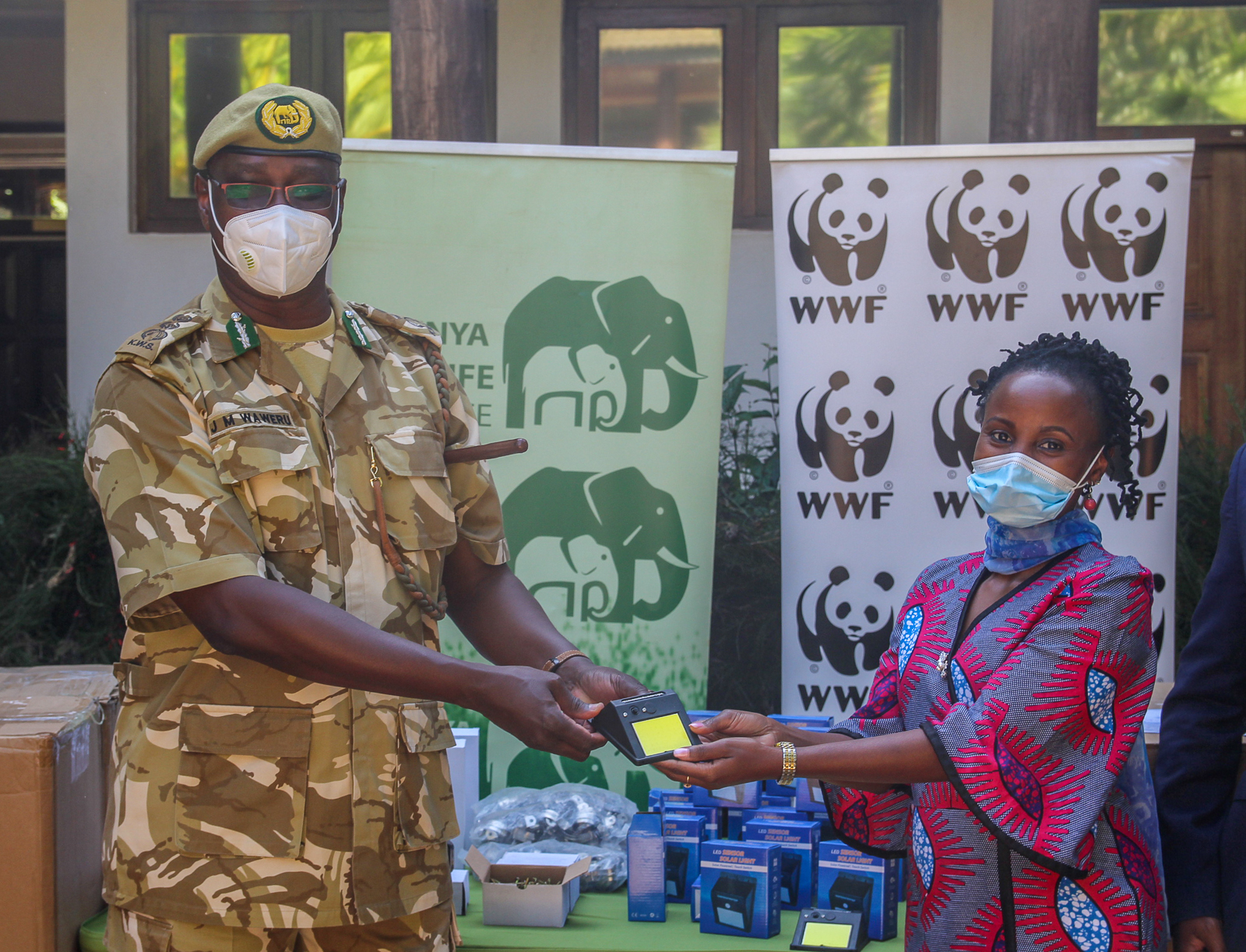
Date Published:
In keeping with the spirit of community collaborative conservation championed by KWS and her partners, WWF donated 1,800 predator-deterrent lights to KWS, June 3, 2021 at KWS Headquarters.
KWS Director General, Brig (Rtd.) John Waweru expressed his gratitude at the continued, unwavering support afforded to the Service by WWF since it commenced operations in Kenya in 1962. He lamented the big cats’ predation on livestock owned by communities living adjacent to wildlife sanctuaries, saying that predators such as leopards tended to kill a whole herd of say, goats, yet only devour one. This poses grave danger to a pastoralist’s livelihood.
The DG said such donations were a win-win for all parties, because they created good rapport between the Service and communities, who understand that KWS and WWF are empathetic to their welfare beyond simply facilitating compensation for loss.
Brig (Rtd.) Waweru stated that livestock losses to predation since 2016 amounted to approximately 56 million shillings. He thanked WWF for their invaluable assistance, which has positive impact on KWS and community relations. Such collaborations yield trust from communities, who in turn alert KWS and other law enforcement agencies about poaching and other security risks which may arise, he said.
The DG assured WWF that a MoU was being finalized so that future such collaborations were conducted in a more streamlined manner, saying that the Service looked forward to even more collaborations in future.
Speaking on behalf of WWF CEO Mr. Mohamed Awer, Head of Finance and Operations Mary Kagera, said that the 60-year old collaboration between KWS and WWF is slated to continue into the distant future, because both organizations are entrenched in conservation. “One of WWF’s critical goals outlined in its current 10-year strategic plan, is to ensure that the co-existence between humans and wildlife is as peaceable as can be, which goal has been aligned to the 10-year National Wildlife Strategy and respective species National Action Plans,” she said.
A demonstration on the efficacy of the predator-deterrent lights was conducted by Coexistech Ltd, a company which focuses on co-existence technology for wildlife, community and innovation.
The journey towards effective predator-deterrent lights started with burying wires, which would be eaten by rats or trampled on by livestock. Over the last six years, the company has developed a stand-alone solar-deterrent system, wherein during the day, it absorbs heat energy through the solar panel at the top, which allows it to flash continuously all night long. Predators have a night time visual acuity ten times that of humans, and the flashing lights render them temporarily blind. Their pupils are thus unable to determine whether it is day or night, and this stops them because they can neither pinpoint a target nor calculate risks. Increasing risks by using the lights deters predation because predators consequently turn their attention to wild ungulates as a source of food. The battery lights have a three to four-year lifespan and are constructed to be resistant to elements of weather.
WWF Kenya and KWS have partnered in various conservation ventures, including the National Lion Census which employed the spatially explicit capture-recapture method, the equipping of the 10 rhino sanctuaries in Kenya, training of 40 wardens on the safe system framework to develop a holistic human/wildlife conflict strategy, support for the aerial census for large mammals in the Mara landscape last month, support of 10,000 litres of fuel to Tsavo for firebreaks maintenance, to name a few.
Future joint activities include the construction of 90 predator-proof bomas in Amboseli, Tsavo and the Mara region; the construction of a 24-kilometre solar-powered elephant-deterrent fence, an assortment of HWC equipment donations valued at 3.5 million shillings, and many more.





